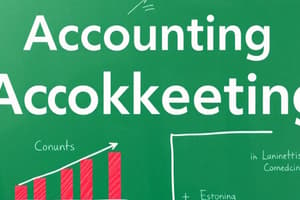Podcast
Questions and Answers
What is the main purpose of bookkeeping?
What is the main purpose of bookkeeping?
- Managing cash flow
- Classifying financial transactions
- Providing accurate and timely information for decision-making (correct)
- Recording financial transactions in a single account
Which type of bookkeeping is suitable for small businesses and individuals with simple financial transactions?
Which type of bookkeeping is suitable for small businesses and individuals with simple financial transactions?
- Triple-entry bookkeeping
- Single-entry bookkeeping (correct)
- Double-entry bookkeeping
- Computerized bookkeeping
What distinguishes double-entry bookkeeping from single-entry bookkeeping?
What distinguishes double-entry bookkeeping from single-entry bookkeeping?
- Involves recording financial transactions in two accounts (correct)
- Suitable for small businesses
- Less complex method of bookkeeping
- Involves recording financial transactions in a single account
Which type of bookkeeping is more efficient and accurate than manual bookkeeping?
Which type of bookkeeping is more efficient and accurate than manual bookkeeping?
For what kind of businesses is double-entry bookkeeping suitable?
For what kind of businesses is double-entry bookkeeping suitable?
What is the purpose of recording, classifying, and summarizing financial transactions in bookkeeping?
What is the purpose of recording, classifying, and summarizing financial transactions in bookkeeping?
What is the purpose of recording financial transactions in bookkeeping?
What is the purpose of recording financial transactions in bookkeeping?
How does bookkeeping help businesses manage their cash flow?
How does bookkeeping help businesses manage their cash flow?
What is the primary purpose of classifying transactions into different accounts in bookkeeping?
What is the primary purpose of classifying transactions into different accounts in bookkeeping?
Which financial statement provides an overview of a business's financial health?
Which financial statement provides an overview of a business's financial health?
What is one of the benefits of bookkeeping for businesses?
What is one of the benefits of bookkeeping for businesses?
Why is accurate financial information essential for decision-making purposes?
Why is accurate financial information essential for decision-making purposes?
Flashcards are hidden until you start studying
Study Notes
Bookkeeping
Overview
Bookkeeping, also known as bookkeeping or accounting, is the practice of recording, classifying, and summarizing financial transactions. It is the process of maintaining financial records and documents to provide accurate and timely information for decision-making purposes. Bookkeeping is essential for small businesses, non-profit organizations, and individuals who need to track their finances and manage their cash flow.
Types of Bookkeeping
There are different types of bookkeeping, including:
Single-entry Bookkeeping
Single-entry bookkeeping is a simple method of bookkeeping that involves recording financial transactions in a single account. It is suitable for small businesses and individuals with simple financial transactions.
Double-entry Bookkeeping
Double-entry bookkeeping is a more complex method of bookkeeping that involves recording financial transactions in two accounts: a debit account and a credit account. It is suitable for larger businesses and organizations with more complex financial transactions.
Computerized Bookkeeping
Computerized bookkeeping involves using software to record, classify, and summarize financial transactions. It is more efficient and accurate than manual bookkeeping and is suitable for businesses and organizations with large volumes of financial transactions.
Bookkeeping Procedures
Bookkeeping procedures include:
Recording Transactions
Bookkeepers record financial transactions in the appropriate accounts. They record every financial transaction that occurs in the business, such as sales, purchases, expenses, and income.
Classifying Transactions
Bookkeepers classify transactions into different accounts based on their nature. For example, sales are recorded in the sales account, purchases are recorded in the purchase account, and expenses are recorded in the expense account.
Summarizing Transactions
Bookkeepers summarize financial transactions into financial statements such as income statements, balance sheets, and cash flow statements. These statements provide an overview of the financial health of the business.
Benefits of Bookkeeping
Bookkeeping has several benefits, including:
Accurate Financial Information
Bookkeeping provides accurate and timely financial information that is essential for decision-making purposes.
Compliance with Regulations
Bookkeeping helps businesses and organizations comply with financial regulations and reporting requirements.
Improved Cash Flow Management
Bookkeeping helps businesses and organizations manage their cash flow by providing accurate information on income and expenses.
Better Financial Planning
Bookkeeping provides accurate financial information that is essential for financial planning and forecasting.
Improved Decision-making
Bookkeeping provides accurate financial information that is essential for making informed business decisions.
Conclusion
Bookkeeping is an essential practice for small businesses, non-profit organizations, and individuals who need to track their finances and manage their cash flow. It is a process of maintaining financial records and documents to provide accurate and timely information for decision-making purposes. Bookkeeping procedures include recording, classifying, and summarizing financial transactions. Bookkeeping has several benefits, including accurate financial information, compliance with regulations, improved cash flow management, better financial planning, and improved decision-making.
Studying That Suits You
Use AI to generate personalized quizzes and flashcards to suit your learning preferences.




